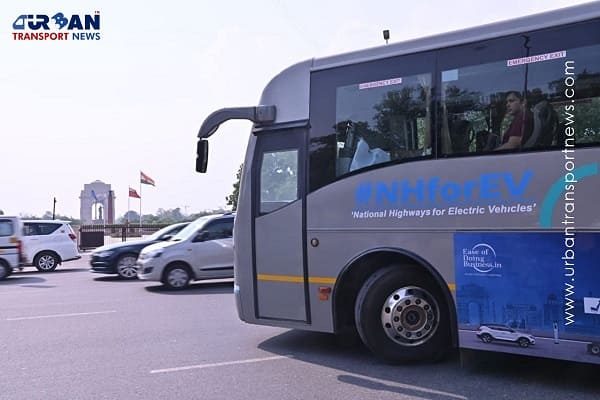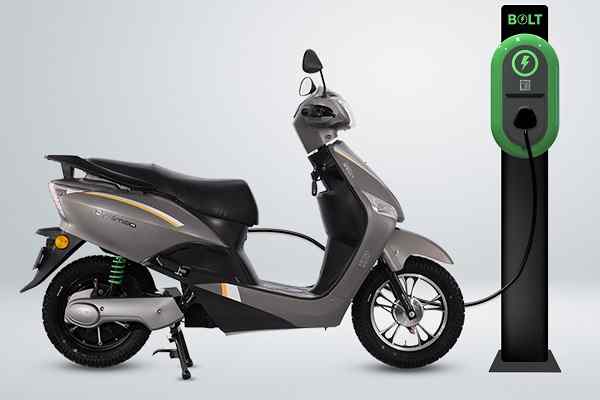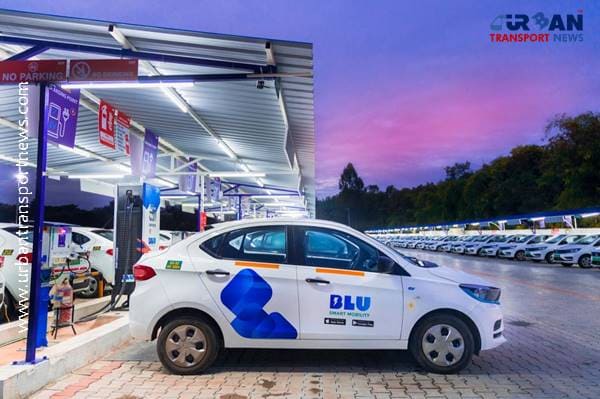 North-South Commuter Railway (NSCR): Modern Train Network Connecting Luzon Island
North-South Commuter Railway (NSCR): Modern Train Network Connecting Luzon Island India launched Bharat Taxi Service as First Cooperative-Owned Digital Mobility Platform
India launched Bharat Taxi Service as First Cooperative-Owned Digital Mobility Platform India places World’s First Live Commercial Order for Hyperloop-Based Cargo Logistics
India places World’s First Live Commercial Order for Hyperloop-Based Cargo Logistics How Weigh-in-Motion Systems Are Revolutionizing Freight Safety
How Weigh-in-Motion Systems Are Revolutionizing Freight Safety Women Powering India’s Electric Mobility Revolution
Women Powering India’s Electric Mobility Revolution Rail Chamber Launched to Strengthen India’s Global Railway Leadership
Rail Chamber Launched to Strengthen India’s Global Railway Leadership Wage and Hour Enforcement Under the Massachusetts Wage Act and Connecticut Labor Standards
Wage and Hour Enforcement Under the Massachusetts Wage Act and Connecticut Labor Standards MRT‑7: Manila’s Northern Metro Lifeline on the Horizon
MRT‑7: Manila’s Northern Metro Lifeline on the Horizon Delhi unveils ambitious Urban Mobility Vision: Luxury Metro Coaches, New Tunnels and Pod Taxi
Delhi unveils ambitious Urban Mobility Vision: Luxury Metro Coaches, New Tunnels and Pod Taxi Qatar approves Saudi Rail Link Agreement, Accelerating Gulf Railway Vision 2030
Qatar approves Saudi Rail Link Agreement, Accelerating Gulf Railway Vision 2030
Accelerating India’s Electric Vehicle Revolution: A Vision for the Future

India stands on the cusp of a transportation revolution, led by NITI Aayog's ambitious efforts to transform the electric vehicle (EV) landscape. With over 50 initiatives driving the electric mobility sector, NITI Aayog is reshaping the future of transportation through strategic partnerships and comprehensive policies. In an interview, Sudhendu J Sinha, Advisor — Infrastructure, Connectivity & Electric Mobility at NITI Aayog, sheds light on these transformative changes.
Raising Awareness and Addressing Affordability
To accelerate the adoption of electric vehicles, NITI Aayog is addressing two crucial aspects: consumer awareness and affordability. The organization recognizes that beyond price, the reliability and value for money of EVs are key concerns for Indian consumers. NITI Aayog has launched awareness campaigns like ‘Shoonya’ and ‘e-FAST,’ leveraging both traditional and digital media to highlight the benefits of EVs. These initiatives not only educate the public about the environmental advantages of EVs but also aim to build consumer trust through real-life testimonials from gig workers.
Battery prices, which have been steadily decreasing, play a significant role in making EVs more accessible. As advancements in battery technology continue, further price reductions are expected, signaling a positive trend for prospective buyers. Additionally, the simplicity of EVs—featuring approximately 20 parts compared to the 200 parts of internal combustion engines—opens opportunities for both large and small manufacturers to enter the market. This reduction in complexity not only lowers production costs but also enhances the potential for scaling up production.
Peer-to-peer feedback remains crucial in this emerging market. Initiatives such as ‘Shoonya’ showcase user experiences through engaging videos and social media reels, helping to build confidence among potential customers. Soft integration of EVs into popular media, such as movies and series, also serves to amplify the message and normalize EV adoption.
Promoting Investment and Innovation in Manufacturing
NITI Aayog is actively working to position India as a global manufacturing hub for electric vehicles. The organization oversees more than 50 initiatives across the EV ecosystem, including pivotal State EV Policies. The National Mission on Electric Mobility and Battery Storage, chaired by the CEO of NITI Aayog, coordinates efforts among various ministries to drive infrastructure development, vehicle deployment, and industrial growth.
Key initiatives include flagship schemes like FAME (Faster Adoption and Manufacturing of Hybrid and Electric Vehicles) and PLI (Production Linked Incentive), which provide demand-driven and direct manufacturing incentives. Battery manufacturing is a priority, with a focus on sustainable business models and recycling. NITI Aayog also engages with international partners, including the US, Germany, and the UK, to facilitate investments and bring global expertise to India’s EV sector.
Elevating the Indian 2-3 Wheeler Industry
To elevate the Indian 2-3 wheeler automotive industry to global standards, NITI Aayog is taking several critical steps. Technical assistance from renowned global think tanks and formal commitments from countries like Germany, the UK, and the US are instrumental in shaping initiatives such as NDC-TIA, GEF, ZEV-TC, and Transport Breakthrough.
The National Mission collaborates with the Department of Science and Technology (DST) and the Bureau of Indian Standards (BIS) to develop indigenous standards for EVs. Recent achievements include the establishment of an Indian charging standard across all stations. The introduction of EV-specific courses at premier educational institutions, in partnership with Centres of Excellence (CoEs) at 16 IITs, aims to cultivate a new generation of engineers equipped with the skills to drive innovation.
Positioning India as a Global Leader
NITI Aayog envisions leveraging the EV revolution to position India as a global leader in manufacturing. The shift from internal combustion engine vehicles to electric mobility represents a significant opportunity for India. While developed countries had an early advantage in the ICE vehicle industry, India’s current focus is on revolutionizing transportation with a clear vision: making it common, connected, convenient, congestion-free, charged, clean, and cutting-edge.
Despite challenges such as the scarcity of critical minerals, India is exploring Circularity Principles to bridge these gaps. By fostering a robust ecosystem where MSMEs complement the manufacturing base of large OEMs, India aims to democratize the EV sector and enhance its global competitiveness.
The Global Value Chain initiative seeks to tap into the global market for automobile components and deliver world-class products in sectors not reliant on critical minerals. The growth of the automobile industry, which is a significant contributor to employment and GDP, will stimulate further economic growth and industry development.
Collaboration for World-Class Quality
Achieving the goal of producing ‘objects of desire’ with world-class quality requires collaboration among government, industry, and research institutions. The ‘Triple Helix theory,’ which emphasizes the synergy between these sectors, is vital for driving innovation. Globally, institutions serve as innovation hubs, partnering with industry for commercialization. In India, leveraging this collaborative approach will enhance capabilities in EV technology and innovation, setting the stage for a transformative shift in the sector.
Integrating Renewable Energy with Electric Mobility
NITI Aayog is also focused on integrating renewable energy sources with electric mobility. Key areas include enhancing grid stability, developing energy storage solutions, and reducing carbon emissions. The emphasis is on building robust infrastructure to manage the intermittent nature of renewable energy sources and synchronizing EV charging with high renewable energy generation periods.
Energy storage solutions are a critical component, supporting grid stability and enabling EVs to serve as mobile energy storage units. By promoting policies that incentivize the use of renewable energy for EVs, NITI Aayog aims to significantly reduce carbon emissions and contribute to India’s climate change mitigation efforts.
India’s electric vehicle revolution, spearheaded by NITI Aayog, represents a significant leap towards a cleaner and more efficient transportation future. With strategic initiatives and collaborations, the country is positioning itself as a global leader in electric mobility. By addressing affordability, promoting investment, and integrating renewable energy, India is not only transforming its transportation sector but also paving the way for a sustainable and innovative future.






